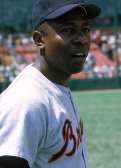TLR, Hank Aaron, and the lasting impact of 6 weeks
This story was excerpted from Scott Merkin's White Sox Beat newsletter. To read the full newsletter, click here. And subscribe to get it regularly in your inbox.
CHICAGO -- You are Tony La Russa, and at the time of this story, you are working as a seldom-used reserve infielder for the Atlanta Braves after having your contract purchased from the Athletics on Aug. 14, 1971.
On a flight home from the West Coast, while walking back to his seat from the bathroom, a revered veteran player beckons for La Russa to come talk.
"Rook, sit down," was the message delivered to La Russa by none other than Henry Aaron.
“That happened maybe three times,” La Russa told me in a recent conversation. “One thing he couldn’t do was say, ‘I watched you play a lot.’ He couldn’t say that. I sat the bench. He said, ‘I watch you practice.’ The conversations ... weren’t anything about how great he was.”
And make no mistake, Aaron was one of the all-time best.
On Monday, the 50th anniversary of Aaron’s record-breaking 715th home run -- coming off the Dodgers’ Al Downing in the fourth inning at Atlanta Stadium and breaking Babe Ruth’s mark -- was celebrated and remembered in Atlanta and across baseball. Aaron not only was a Hall of Famer on the field, but just as much so off the field. He was as great a representative of the sport as anyone ever associated with the game.
La Russa, who is currently the White Sox special advisor to the executive vice president, had a chance to be teammates for six weeks with the man who finished with 755 home runs over 23 seasons, with a high mark of 47 in that ’71 campaign.
“He’s one of the greatest position players of all time,” La Russa said. “But there wasn’t anything about the way he carried himself that separated him from his teammates. … He was really down to earth. There wasn’t anything pretentious like a superstar.”
Aaron taught La Russa about managing the length of a season. It was a lesson La Russa applied during his 35 years as manager -- which resulted in 2,884 victories, three World Series titles and an eventual Hall of Fame induction -- in that it was all mental and you can’t give into the test of the season’s duration.
During his first homestand with the Braves, La Russa was around a bunch of teammates before a game who were saying things like, "I got 11. I got 14." They had watched Aaron hit and knew his propensity for hard contact, so they would guess how many at-bats in a row he was going to hit the ball with authority.
“There were six guys doing it,” La Russa said. “The lowest guy had nine and the highest had 17. He went like, bam, bam, bam, how many days in a row.”
These two baseball legends got to know each other over the years, and Aaron was present in Cooperstown when La Russa was inducted in 2014. Tom Seaver, who played for La Russa with the White Sox, was poking fun at his former manager about being a “coattail” Hall of Famer, according to a smiling La Russa. Seaver also told La Russa, “If you ever mess this up, we are going to deduct you as quickly as we inducted you,” La Russa continued.
“Hank told me later, ‘He’s really a kidder. He doesn’t mean all that stuff,’” La Russa said. “I said, ‘Yeah, he does.’”
Having a high expectation for integrity was another attribute Aaron was known for within the baseball family. La Russa defined that expectation.
“Integrity meant you competed, you respected your opponent, how you conducted yourself personally,” La Russa said. “He was very committed to portraying the profession and the personal side to young people, especially baseball fans, who would follow.
“There was a lot to him. … He was always very nice. … He had so much courage.”



